If the appearance of your driveway isn’t what you desire, then you should look into tar and chip as an option. A tar and chip surface blends a flat paving material with a stone mix. Before you decide, read about how this paving solution works and the advantages of installing it. (more…)
BLOG
Posts Tagged ‘driveway paving’
The Advantages of Installing an Oxford, Pennsylvania Tar and Chip Driveway
Thursday, May 5th, 2022Advantages of Asphalt Paving Your Maryland Driveway
Thursday, April 14th, 2022Are you arranging to install a driveway on your residential home? When paving your driveway, two of the most common choices are asphalt and concrete. While each type of driveway has its strengths and weaknesses, asphalt offers some advantages over concrete. Read on for the reasons to go with asphalt paving your driveway.
The Benefits of Concrete Driveways
Friday, November 6th, 2015
With the amount of options concrete driveways provide, it’s easy to see why it adds so much curb appeal.
With low maintenance and a long life span, concrete driveways are increasing popularity.
Concrete driveways are becoming more and more common for new home construction projects, but homeowners with an older property are also taking advantage of concrete’s many benefits. Let’s take a look at some of the ins and outs of concrete driveways. (more…)
Do I Need to Replace, Repair, or Resurface My Driveway?
Friday, January 16th, 2015There’s nothing quite like driving down a long stretch of exquisite asphalt. However, while driveways are an important portion of any home, they’re also somewhat costly. That’s why many homeowners, upon noticing driveway damage, will attempt to patch it up rather than opt for resurfacing or replacing. While this can cost less in the short run, if the damage is extensive enough, it will only lead to more problems, costing you quite a lot later. Tristate paving is here with a guide to knowing when you can patch your driveway, and when you need to resurface or replace.
When to Repair
Between water damage caused by freezing and thawing over the seasons, and the sheer work of supporting heavy cars that roll over them daily, driveways take a lot of abuse. If you spot cracks that have a width of less than ¼ in, you probably only have surface level damage and this can easily be fixed with a liquid crack-filler. However, wider cracks will require taking measures that are more substantial. While you can temporarily cover up these cracks with patching material, this is only a stop-gap fix that will soon wear out.
When to Replace
If your driveway is more than 20 years old, it’s most likely best to have it replaced. After this much time under elemental exposure, even the best driveways can break down. Patching these antiques is won’t be worth the trouble or cost. Your driveway may not even have a structural problem to necessitate replacement. Oftentimes, new homeowners or those looking to sell the house will replace for the visual appeal. Patching isn’t invisible and can sometimes look unsightly.
When to Resurface
If you know repairing won’t be enough, but replacement is too expensive, there is an “in-between” option that’s typically only offered by top quality asphalt repair companies like Tristate Paving. It’s called resurfacing. Resurfacing essentially strips off your driveway’s top layer and replaces it, resulting in a driveway that appears brand-spanking-new, but costs much less than a total replacement. While this won’t fix issues with the foundation, you won’t be seeing any cracks or potholes for awhile either.
Need Driveway Repair, Replacement, or Resurfacing?
Call Tristate Paving. Our experienced paving professionals have plenty of experience with driveway repair, resurfacing, and replacement, and can take care of your asphalt installation or repair needs quickly, and at an affordable price. At Tristate Paving we take great pride in our customer service and we’ll be more than happy to sit down and figure out what asphalt repair option works best for you.
Our area numbers are:
West Chester: 610.563.9456
Oxford: 610.932.3566
Delaware: 302.757.4100
Check back here for weekly updates on current projects, important paving facts and info, and smart ideas for homeowners interested in concrete, asphalt or hardscaping work.
Follow us on Facebook, Twitter, Pinterest, and Google+
Asphalt vs. Concrete Driveways
Tuesday, December 23rd, 2014If you’re constructing a new home, or are just in the market for a brand new driveway, you’re doubtlessly faced with a lot of tough decisions. The most important decision you can make is selecting between the two most popular driveway paving materials: Concrete and asphalt. Tristate Paving is here with the differences between these two materials so that you can make the best choice possible. It’s important to know that asphalt and concrete do have many similarities. They both need well compacted gravel bases, need time to set before use, and are made from stone and sand. The main difference in their composition is the adhesive used to bind them together. Asphalt is adhered with tar, while concrete uses cement. This small difference in the material composition of the two substances ripples outward, resulting in drastic differences between the two.
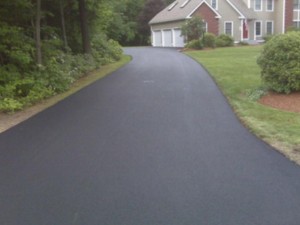
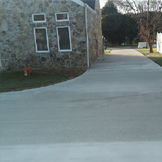
Appearance
Different people will have a preference as to whether they’d like concrete or asphalt better. Asphalt driveways appear as natural extensions of the road while concrete ones have a distinctly different appearance. However, both can have their looks modified. You can stain, etch, and engrave concrete as well as apply a variety of finishes to customize your driveway to match your home. Asphalt is somewhat more limited and cannot be stained. Although, tint may be added to the mixture to alter the color slightly.
Climate
Climate can play an important part in selecting what to pave your driveway with. Concrete is more likely to crack or fracture due to extreme cold. It can also be damaged by defrosting salts. Conversely, asphalt performs less well in hotter climates because intense and prolonged exposure to heat can cause the tar to melt and potentially lose its form. Consider your climate carefully when paving your driveway.
Maintenance
Both materials have drastically different maintenance requirements. Asphalt requires the application of a protective sealant about every three years, which can increase its lifespan to roughly 30 years. Concrete driveways do not need sealant but can benefit from it greatly, preserving their appearance for longer. Concrete driveways do stain easier than asphalt and must have degreaser applied to them to take care of oil spills. Asphalt is typically easier to repair and can be affordably resurfaced rather than replaced, an option that is not available to concrete driveway owners.
Price
Asphalt is typically a good deal less expensive than concrete to install. On average asphalt will run between $2.50 to $4.00 per square foot. Concrete, on the other hand, usually runs between $4.00 to $6.00 per square foot for a basic installation and can cost more if you’re looking at applying special finishes.
Need Help Making the Decision?
Call Tristate Paving. Our experienced paving professional have a long history installing both concrete and asphalt driveways and we’ll be more than happy to sit down and figure out which option works best for you.
Our area numbers are:
West Chester: 610.563.9456
Oxford: 610.932.3566
Delaware: 302.757.4100
Check back here for weekly updates on current projects, important paving facts and info, and smart ideas for homeowners interested in concrete, asphalt or hardscaping work.
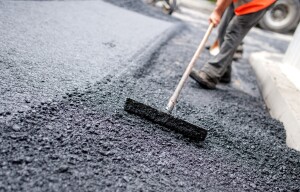
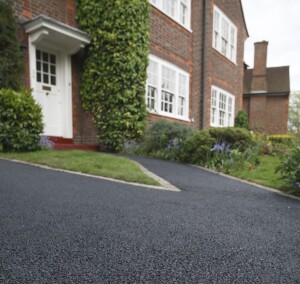
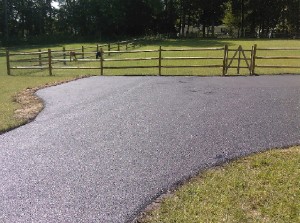
 ASPHALT
ASPHALT
 Commercial
Commercial
 Residential
Residential
 DOT
DOT
 Decorative
Decorative
 Sealcoating
Sealcoating
 Infrared Repairs
Infrared Repairs
 CONCRETE
CONCRETE
 Flat Work
Flat Work
 Decorative
Decorative
 Curbs/Gutters
Curbs/Gutters
 Steps
Steps
 Slab Jacking
Slab Jacking
 Pump Trucks / Pump Trailers
Pump Trucks / Pump Trailers
 HARDSCAPES
HARDSCAPES
 Walls / Borders / Curbs
Walls / Borders / Curbs
 Walks / Patios
Walks / Patios
 Aprons
Aprons
 Steps
Steps
 Columns / Fire Pits
Columns / Fire Pits
 Outdoor Kitchens
Outdoor Kitchens